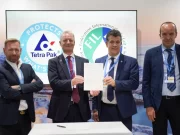
1. Water is often the forgotten nutrient but plays a very important role in unlocking genetic potential.
a) Water quality and management of the system supplying water to the birds is vital to ensuring optimum flock performance.
b) Water constitutes about 55% to 75% of body weight in poultry birds and is considered as one of the most important nutrients for their growth and development.
2. On an average, birds consume twice the amount of water as feed on weight basis.
3. Water quality challenges can have detrimental effects on the normal physiology of the birds resulting in reduced performance.
4. Drinking water for poultry arrives from different sources posing a serious threat to the quality of water due to the presence of a wide variety of
a) bacterial contaminants,
b) inorganic ions
c) or other pollutants,
which directly or indirectly affect the overall performance and health of birds.
5. Hence, maintaining and providing good quality water is essential for the efficient development of birds in terms of health and nutrition.
6. Water quality is evaluated by several criteria such as
a) total alkalinity,
b) hardness,
c) total dissolved solids (TDS), etc.,
7. But the primary and most important parameters in poultry are
a) pH,
b) hardness
c) and microbiological analysis.
d) TDS
8. Ideal parameters in Poultry drinking water:
a) ideal pH between 6 to 6.5
b) Hardness increases pH of water.
c) hardness between 60 – 180 ppm
d) TDS: Less than 1,000 is desirable and No serious burden to any class of poultry.
– between 1,000 to 2,999 is Satisfactory.
e) microbiological analysis:
– To be considered acceptable, water should contain less than 100 CFU/ml of coliforms and less than 100,000 CFU/ml of total bacteria.
f) There should be no Salmonella contamination in the drinking water.
g) and microbial count of less than 1000 colonies forming units ( cfu) /ml is optimum for poultry drinking water.
9. Hard water has higher concentrations of dissolved minerals, such as calcium and magnesium.
a) High levels of magnesium sulfate (MgSO4) may cause an increase in water consumption, wet droppings, and a drop in production & thin shelled eggs.
b) Extreme hardness may diminish the effectiveness of water-administered medications, disinfectants, and cleaning agents.
c) Water is softened by removing these minerals, either mechanically or chemically.
10. RO water purifiers are used in few Poultry farms where hardness and TDS is on higher side due to ground water.
a) Main disadvantage is wastage of water up to 50%.
b) 10% of water is being used for cleaning and washing.
c) Remaining 40% of water is used for gardening and agriculture purpose in few farms.
d) This RO method is more viable in Poultry farms where underground water is adequate and sufficient.
11. TDS include inorganic and organic substances that cannot be filtered through a filter paper.
12. The main risk with closed water systems is the build-up of a biofilm which typically is not visible.
a) This biofilm is a thick mucus (slime) secreted by bacteria which builds up on the inside of a waterline if the system is not managed properly.
b) This biofilm can cause flock health challenges as it harbours bacteria such as E. coli and salmonella.
c) Biofilms are also difficult to remove and require mechanical action to remove them from the water system.
d) They may also block nipples or cause them to leak.
13. A robust cleaning and sanitising programme during a turnaround is recommended to prevent biofilms.
14. Flush water lines regularly
- A high pressure flush should be performed on water lines between each flocks.
- Ideal pipeline cleaner in your poultry farm.
15. Please use DT Smart of Huvepharma which is a alkaline detergent for cleaning of pipes , feeding systems and cleaning machines between flocks.
a) Breaks down all types of dirt.
b) High descaling and degreasing power.
c) dissolves organic matter and mineral deposits.

Dr. V. Rajendra Prasad
(Poultry Consultant)



























